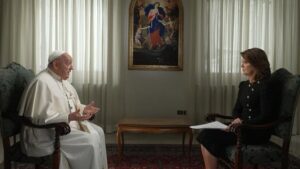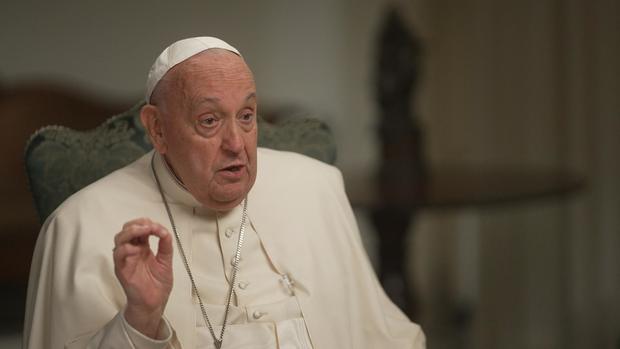Francis is the first pope of the Americas, the first of his name, and more than any other pope in recent times, he has dedicated his life and ministry to the poor, the marginalized, and the forgotten. All this while he leads the Catholic Church on difficult and sometimes controversial issues that not everyone supports. We were granted an extraordinary interview at the Vatican, and we spoke with him in Spanish, his native language, through a translator, for more than an hour. The candor of this 87-year-old octogenarian was not lost in translation, nor were his intelligence and convictions. We begin by commenting on the first “World Children’s Day” celebrated by the Church. Next weekend, Pope Francis will welcome tens of thousands of children to the Vatican, including war refugees.
Norah O’Donnell: During World Children’s Day, the UN says that more than a million people will face famine in Gaza, many of them children.
Pope Francis: Not only in Gaza. Let’s think about Ukraine. A lot of guys from Ukraine come here. Do you know one thing? Don’t those children know how to smile? I tell them, let’s see. [FAKES A SMILE]… They forgot to smile. And this is very hard.
Norah O’Donnell: Do you have a message for Vladimir Putin regarding Ukraine?
Pope Francis: Please… in countries at war, everyone, stop the war! Seek negotiation. Seek peace. A negotiated peace is always better than an endless war.
Norah O’Donnell: What’s been happening in Gaza has caused a lot of division, a lot of pain around the world. I don’t know if you’ve seen in the United States that there have been a lot of protests on college campuses and increasing anti-Semitism. What would you say about how to change that?
Pope Francis: All ideology is bad. And anti-Semitism is an ideology, and it is bad. The “anti” is always bad. One can criticize this government, that other, the government of Israel, the Palestinian government. You can criticize all you want, but not anti-race. Neither anti-Palestinian nor anti-Semitic. No.

Norah O’Donnell: I know you call for peace. You have called for a ceasefire in many of your sermons. Can you help negotiate peace?
Pope Francis: [SIGH] Pray. I pray a lot for peace. And also suggest, “Please stop. Negotiate.”
Prayer has always been at the center of Pope Francis’ life since he was born under the name Jorge Mario Bergoglio in Argentina, in 1936, to a family of Italian immigrants. Before entering the seminary, Bergoglio worked as a chemist.
His personal formula is simplicity. He continues to wear the same simple silver crucifix that he wore when he was archbishop of Buenos Aires. But it is not what Francis wears, but where he lives that has set the tone of his papacy, for 11 years.
Instead of a palace on St. Peter’s Square, he chose to live in the Vatican’s guest house, Casa Santa Marta.
There he received us, under a painting of the Virgin Mary. Despite his sacred surroundings, Francis has not abandoned his sense of humor, even when he addresses serious issues, such as the migrant crisis.
Norah O’Donnell: My grandparents were Catholic. They emigrated from Northern Ireland in the 1930s to the United States in search of a better life. And I know that his family also fled from fascism. And you have talked about migrants, many of them children, and you have said that you urge governments to build bridges, not walls.
Pope Francis: Migration is one thing that makes a country grow. They say that you, the Irish, migrated and brought the whiskey, and that the Italians migrated and brought the mafia… [LAUGHING] It’s a joke, don’t take it the wrong way. But migrants sometimes suffer a lot. They suffer a lot.
Norah O’Donnell: I grew up in Texas. And I don’t know if you’ve heard it, but in the State of Texas, they are trying to close a Catholic charity home on the border with Mexico that provides humanitarian assistance to undocumented immigrants. What do you think about that?
Pope Francis: Madness, madness. But, closing the border and leaving them there… is crazy. The migrant has to be received. Then you see how it is treated. Maybe we should send him back, I don’t know, but each case should be studied with humanity… with humanity.
A few months after becoming pope, Francis visited a small Italian island near Africa to meet migrants fleeing poverty and war.
Norah O’Donnell: Your first trip as Pope was to the island of Lampedusa, where you spoke about suffering. And I was very impressed when you talked about globalization, about indifference. What’s going on?
Pope Francis: Say it in Creole very clearly? People wash their hands! There is so much Pontius Pilate loose… that he… sees what is happening, the wars, the injustices, the crimes… “It’s okay, it’s okay” and he washes his hands. The indifference. When the heart becomes hard… and is indifferent.
Please, we have to make our hearts sensitive again. We cannot be indifferent to these dramas of humanity. The globalization of indifference is a very ugly, very ugly disease.
Pope Francis has not been indifferent to the most pernicious scandal that has plagued the Church – the rampant sexual abuse of hundreds of thousands of children around the world, for decades.
Norah O’Donnell: You have done more than anyone to try to reform the Catholic Church and repent for years of unspeakable sexual abuse of children by members of the clergy. But has the Church done enough?
Pope Francis: You have to keep doing it. Unfortunately, the drama of abuse is tremendous. And about that, right conscience; and not only not allow, but put the conditions so that it does not happen.
Norah O’Donnell: You said “zero tolerance.”
Pope Francis: We must not tolerate. The same in the church, when there is a case of a consecrated man or woman who abuses, the entire law falls on it. There was a lot of progress in that.
The capacity for forgiveness and openness is what has defined Pope Francis’ leadership over a church of almost 1.4 billion Catholics. He put them and the world on notice when in 2013, at a spontaneous press conference on a plane, he spoke on the issue of homosexuality.
“If a person is gay,” he said, “and he seeks the Lord and has good will, who am I to judge?”
…And he didn’t stop there.
Norah O’Donnell: Last year you voted to allow Catholic priests to bless same-sex couples. That’s a big change. Because?
Pope Francis: No, what I allowed was not to bless the union. That cannot be done because that is not the sacrament. Can’t. The Lord made it so. But yes, bless each person. The blessing is for EVERYONE. For all. Blessing a homosexual union goes against the law, the natural law, the law of the Church. But bless each person, why not? The blessing is for everyone. Some were scandalized by that. Because? For all. All!
Norah O’Donnell: You’ve said, “Who am I to judge? Homosexuality is not a crime.”
Pope Francis: No. It is a human fact.
Norah O’Donnell: There are conservative bishops in the United States who oppose your new efforts to reconsider teachings and traditions. How do you respond to their criticism?
Pope Francis: You use an adjective, “conservatives”, that is, a conservative is someone who clings and does not want to see beyond. It is a suicidal attitude. Because it is one thing to take into account tradition, to take into account yesterday’s situations, but another thing is to close oneself in a square dogmatic.
Pope Francis has placed more women in positions of power than any of his predecessors, but he told us that he opposes allowing women to be ordained as priests or deacons.
Pope Francis’ devotion to traditional doctrine has led some Vatican reporters to say that he has changed the tune of the Church, but that the lyrics remain essentially the same. This frustrates those who want to see it change the rules regarding Catholic priests being able to marry, the use of contraceptives and surrogacy.
Norah O’Donnell: I know of women who are cancer survivors, who cannot have children, and turn to surrogate mothers. This is against the doctrine of the Church.
Pope Francis: Talking about surrogacy, in the most technical sense of the word, no, it doesn’t work. Sometimes surrogacy has become a trade, and it is very hard. It is very hard.
Norah O’Donnell: But sometimes for some women it’s the only hope.
Pope Francis: Maybe. The other hope is adoption. I would say, in each case, that they clearly consult the situation, that they consult it medically and then morally. I believe that in these cases a general law is given, but we must go to each case in particular to see the situation, as long as the moral principle is not overridden. But you’re right. I like, I want to tell him, his expression when he told me, “In some cases it’s the only chance.” It seems that you feel these things. Thank you.
Norah O’Donnell: I think that’s why so many people… have found hope in you, because you have been more open and understanding, perhaps, than previous Church leaders.
Pope Francis: We must be open to everything. The Church is that: everyone, everyone, everyone. “What is a sinner?” I am also a sinner. All! The Gospel is for EVERYONE. If the Church puts a customs office at its door, it ceases to be the Church of Christ. All.
Norah O’Donnell: When she looks at the world, what gives her hope?
Pope Francis: Everything. One sees tragedies, but one sees… so many beautiful things. One sees heroic mothers, heroic men, men who have hope, women who look forward. That gives me a lot of hope. People want to live. The people move forward. And people are fundamentally GOOD. We are all fundamentally good. That’s why there are little rogues, sinners, but the heart is good.
Produced by Keith Sharman, Julie Morse, and Anna Matranga. Associate producer, Roxanne Feitel. Broadcast associates, Eliza Costas and Callie Teitelbaum. Edited by Jorge J. García
Source: 60 Minutes – CBS










